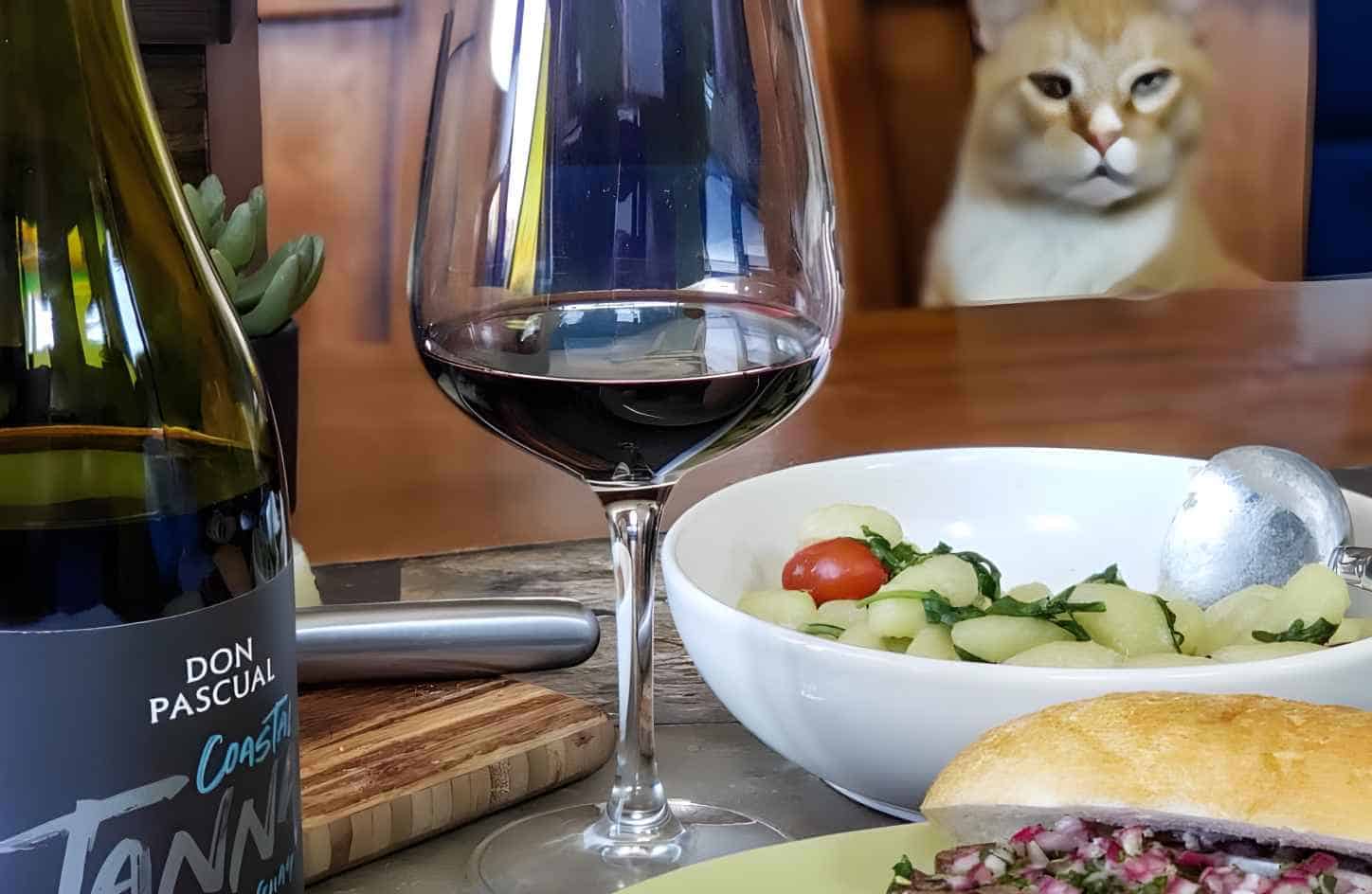Are you looking for a new red wine that can awaken your senses? If yes, then you’ve come to the right place. This article reveals what you need to know about an up-and-coming drink, the Tannat wine. So, what is Tannat Wine? It’s a bold and powerful wine with roots in Southwest France and Uruguay.
Perhaps you’re raring to know more about this wine touted as the next Malbec. Before going any further, check out an overview of what this wine offers.
An Overview of the Tannat Wine

|
Tannin |
High |
|
Body |
Full |
|
Acidity |
Medium-High |
|
Sweetness |
Dry |
|
Fruitiness |
Medium-High |
|
ABV |
13%-15% |
|
Intensity |
High |
|
Oak |
Low-Medium |
|
Primary Flavors |
● Plum ● Licorice ● Smoke ● Cardamom ● Black currant |
|
Dominant Aroma |
● Blackberries ● Leather ● Tobacco ● Licorice |
What is the Tannat wine?
This relatively new wine has been gaining traction over the last few years. It’s known for its high tannins, making it an exceptional candidate for aging. This red wine has a dominant fruity taste and detectable spicy notes. It also boasts an exciting smoky finish.
Please check out this video to learn more about the Tannat wine.
What does Tannat wine taste like?
The Tannat wine’s almost black hue reveals a lot about its flavor. It’s perfect for anyone looking for a potent drink to rock their senses. Every sip exudes a rich and bold flavor. Its intensity lies in its high tannins, immense acidity, and almost nonexistent sweetness.
Wine connoisseurs swear by this drink’s aging potential. The wine becomes more subtle and sophisticated after a few years in storage.
Where did Tannat wine originate?

This wine comes from Uruguay’s national grape, the Tannat. It may be prevalent in this South American country, but you can trace its origins to Madiran. A small village in Southwest France grows this grape mainly for all its red wines.
In the 19th century, grape growers brought the Tannat grape to Uruguay. Fortunately, it thrived in the country’s ideal dry climate and grew abundantly. Since its introduction into the New World, this single-grape wine has delighted the palates of red wine lovers.
What are the Tannat wine styles?
The Tannat wine style development is based on their country of origin. So, the two main types are French Tannat and Uruguayan Tannat. Each one has its set of distinctive characteristics.
The French Tannat has more robust tannins and more noticeable red fruit notes. Wine experts suggest aging them a bit longer for the best drinking experience.
On the other hand, the Uruguayan Tannat is easier on the palate. Its softer tannins make it more mellow than its French cousin. Black fruit flavors are in the spotlight for this drink.
Learn more about French and Uruguayan wines in this video.
Tannat may have been born in Southwest France, but it has found a permanent home in Uruguay. It’s the most prolific grape in this South American country. Touted as Uruguay’s “champion grape,” it has encouraged the creativity of old and new winemakers.
What is the traditional Tannat style?
Seasoned winemakers craft this wine through heavy extraction. The result is a highly high-tannin wine with an almost black hue. It’s best to age this full-bodied wine for many years to achieve a more delightful taste.
Traditionalists age their Tannats in oak barrels. They wait patiently for the right time to open their creations. The result is a bold, silky wine aged to perfection. Tannat wines from 1970 and 1980 still reveal a rich concentration, vibrant acidity, and robust tannins.
What is the modern Tannat style?
This style showcases a more youthful vibe. It has reduced tannins due to a more subtle extraction process. However, it still ranks higher on the tannin scale than other red wines. It’s just less powerful than its traditional counterpart.
This juicier version is best enjoyed after one or two years of aging. It also does not go through any oak aging process. This modern take on Tannat is vibrant and refreshing, making it appealing to many palates.
The modern Tannat showcases the Uruguayan winemakers’ grit and creativity. The Tannat grape may be hard to manage. However, they were able to produce new interpretations for the world to enjoy.
What are the Tannat wines per region?
Each region in Uruguay has its expressions of the Tannat grape. The following are the regions where the grape is grown and their distinct characteristics:
- Maldonado: A modern-style, energetic Tannat that’s fruity, spicy, and full of exquisite tannins.
- Canelones: The original Uruguayan Tannat that’s less aromatic but deeply concentrated.
- Sierra de Mahoma: A fierce Tannat with riveting tannins and fleshier notes.
- Riviera, Salto, and Durazno: A spicy and berry-forward variant with bold tannins.
- Colonia: A warmer and more voluminous Tannat style that’s firm and powerful.
The Best Tannat Wines Around the World

From its humble beginnings in France, the Tannat wine has conquered the world. Aside from wineries in South America and France, producers in Virginia, USA, also have their versions.
We’ve searched for the best Tannat wines around the world. The following are the ones that made the cut.
Vignobles Brumont 2015 Chateau Montus
- Origin: Madiran
- Average Price: $40
The majestic Montus vineyards are responsible for this robust wine. It highlights the solid and concentrated flavors of black fruit. This powerful wine requires years of aging to tone down the raging tannins.
Familia Deicas 2016 Domaine Castelar Vineyard Tannat
- Origin: Uruguay
- Average Price: $40
This South American gem may be jammy and gamy. However, it can also be a soothing drink. Being oak-aged, it gives off a juicy, spicy, and fruity flavor. The blackberry notes perfectly balance the slightly rough tannins.
Chateau Peyros 2015 Vielles Vignes
- Origin: Madiran
- Average Price: $21
This French version perfectly blends 20% Cabernet Franc and 80% Tannat wine. A solid tannin structure dominates the drink. Meanwhile, the strong black fruit notes support every sip. This wine requires more aging for a fuller, richer experience.
Cerro Chapeu 2016 Batovi T1 Tannat
- Origin: Uruguay
- Average price: $38
The dark red color of this wine is a prelude to its explosion of flavors. The exuberant oak blends perfectly with the cassis and blackberry flavors. Its smooth tannins and high acidity taper to a long finish.
Bouza 2017 Parcela Unica B6 Tannat
- Origin: Canelones
- Average Price: $45
A malty and berry scent will greet you when you open a bottle of this wine. Every sip exudes a flavor of ripe fruits, raisins, and Bourbon barrels. With an ABV of 15.5%, this wine is not for the faint-hearted.
Domaine Berthoumieu 2014 Cuvee Charles de Batz
- Origin: Madiran
- Average Price: $25
This wine may be at a lower price, but it does not disappoint. Its firmness and bold structure will revitalize your palate. The ripe fruit flavors, density, and dark tannins all contribute to what makes it powerful.
Enjoying the Tannat Wine
The Tannat wine’s claim to fame is its power and strength. Its robust flavor profile might be intimidating, but it can still be delightful to drink. It needs the proper aging, serving style, and food pairing.
What are the best Tannat wine food pairings?

A strong drink deserves an equally flavor-forward food. Forget your light dishes for now, and bring out the protein-rich delicacies. Fattier cuts of meat and gamey cuisine work best with the Tannat.
Check out this list of food best paired with the Tannat wine.
Beef, Pork, and Game
- Wild boar
- Cassoulet (sausage and bean stew)
- Beef and Pork Barbecue
- Roast pork and beef
- Lamb roast
- Beef skewers
- Fallow deer roast
- Chorizo
Poultry
- Duck confit
- Goose confit
- Roast Chicken
- Chicken Nicoise
- Chicken a la Provencale
- Guinea Fowl
- Poultry Fricassee
Cheese
- Parmesan
- Gorgonzola
- Brie
- Camembert
- Roquefort
- Chaumes
- Fresh Goat Cheese
Vegetables
- Citrus-glazed roasted vegetables
- Roasted Fennel, sunchokes, and sweet potato
Tannat Wine Tasting Tips

A majestic wine like Tannat deserves your full attention. The following steps will help you appreciate this full-bodied wine’s robust flavors and aroma.
Stage1: Use Your Eyes
- Observe the intensity and color by slanting the glass a bit toward you.
- Look over the glass rim.
- Assess the wine’s clarity by holding it up to the light.
Stage 2: Use Your Nose
- Take a whiff of the wine by placing your nose near the rim.
- Swirl the wine glass to activate its bouquet.
- Hold the glass stem and rotate swiftly.
- Smell the wine again.
- Take note of the differences in smell before and after swirling.
Stage 3: Use Your Tongue
- Aerate the wine by drawing some air over it.
- Sip the wine carefully.
- Observe the body, quality, and texture.
How to Serve the Tannat Wine
The best way to enjoy your Tannat wine is to decant it before serving it. One hour in a decanter would make it more palatable.
It’s also essential that the wine is at 64-66 degrees Fahrenheit. Going higher or lower might rob its dominant flavors.
Lastly, use a Bordeaux glass or any oversized wine glass for better appreciation. Then, serve with your choice of recommended meat or cheeses. Enjoy!
Conclusion
So, what is Tannat Wine? Is it merely a powerful wine with solid tannins? Based on this article, it’s more than that. It results from two different worlds coming up with an enchanting drink. It’s also a testament to the beautiful land of Uruguay and its people’s tenacity.


George Moore, co-founder of Wine Flavor Guru, is a charismatic entrepreneur with a rich background in California’s wine industry. Alongside Sylvia, he transformed a Sonoma County vineyard into a source of premium wines. George’s expertise in sourcing exceptional grapes and his approachable style make wine appreciation both accessible and engaging.
